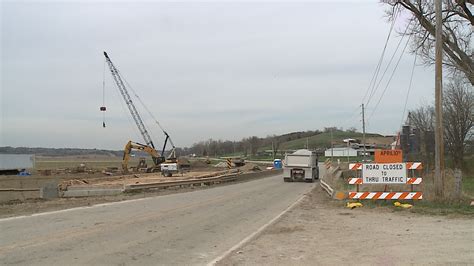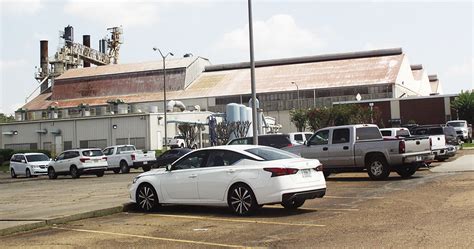
A sudden announcement of closure at PPG Architectural Coatings plant in De Soto, Illinois, has left 300 employees jobless and the local community reeling, blindsided by a decision that ends over 70 years of factory operations.
De SOTO, Ill. – PPG Architectural Coatings announced the immediate shutdown of its De Soto, Illinois, plant, a move that eliminated 300 jobs and abruptly ended decades of manufacturing history, leaving many employees and local officials in shock. The plant, which has been a cornerstone of the community since the 1950s, ceased operations with little advance notice, leading to widespread concern about the economic ramifications for the region.
“It was just a shock,” said De Soto Mayor Ronda Cloud. “I don’t think anybody saw it coming.” Cloud emphasized the plant’s profound impact on the village, noting the loss extends beyond just the employees and their families. “It’s going to affect everybody,” she added, pointing to reduced revenue for local businesses and an uncertain future for many residents.
PPG Industries cited a need to optimize its operations as the primary reason for the closure. “After a careful and thorough review, we have made the difficult decision to close our architectural coatings manufacturing facility in De Soto, Illinois, and move production to other sites within our network,” said a company spokesperson. The company claimed this consolidation will allow for better resource utilization and improve the overall efficiency of its manufacturing processes.
The suddenness of the announcement has become a significant point of contention, with employees reporting they were given minimal notice before being escorted off the premises. “People were told to pack their things and leave,” said one anonymous employee. “There was no real warning, no time to prepare. It’s devastating.”
Local and state officials are scrambling to respond to the crisis, seeking ways to support affected workers and mitigate the economic impact on the community. State Representative Paul Jacobs expressed his disappointment and vowed to explore all available options to assist the displaced workers. “We are working to connect these individuals with resources and opportunities that can help them transition to new employment,” Jacobs stated.
The closure of the PPG plant reflects a broader trend of manufacturing consolidation and automation impacting communities across the United States. While companies pursue efficiency and cost savings, the human cost can be substantial, particularly in smaller towns where a single large employer can represent a significant portion of the local economy.
The impact on De Soto is expected to be profound. The village, with a population of just over 1,500, faces the challenge of absorbing a massive job loss that could ripple through every sector. Local businesses that relied on the plant’s employees and their families as customers are now bracing for a downturn. Real estate values could decline as residents look for work elsewhere, further exacerbating the economic woes.
The shutdown also raises questions about the future of the plant itself. It is unclear whether PPG Industries plans to sell the property or leave it vacant. The fate of the facility could have a significant impact on the long-term viability of De Soto. A new owner could bring new jobs and investment, while a vacant building could become a symbol of economic decline.
The situation in De Soto underscores the vulnerability of communities dependent on single industries. As globalization, automation, and economic pressures continue to reshape the manufacturing landscape, towns like De Soto face an uphill battle to adapt and thrive. The immediate challenge is to provide support for the displaced workers and their families, while the longer-term goal is to diversify the local economy and create new opportunities for growth.
PPG’s History in De Soto and Its Impact
The PPG Architectural Coatings plant in De Soto has been a significant employer and a vital part of the community’s identity for over seven decades. Established in the 1950s, the facility initially served as a key production center for paints and coatings, contributing substantially to PPG’s overall manufacturing capacity. Over the years, the plant expanded its operations and adapted to changing market demands, becoming a reliable source of jobs and economic stability for the residents of De Soto and the surrounding areas.
The plant’s presence in De Soto has fostered a strong sense of community. Generations of families have worked at the facility, and the jobs it provided enabled many residents to build their lives, purchase homes, and support local businesses. The PPG plant was not just a workplace; it was a social hub where employees formed lasting friendships and shared experiences. The closure of the plant severs these long-standing ties and creates a void in the social fabric of the community.
The economic impact of the PPG plant on De Soto has been substantial. The plant’s operations contributed to the local tax base, helping to fund essential services such as schools, infrastructure, and public safety. The employees of the plant spent their earnings at local businesses, supporting retailers, restaurants, and other service providers. The plant also indirectly supported other businesses in the region, such as suppliers and transportation companies.
The closure of the PPG plant will have far-reaching economic consequences for De Soto. The loss of 300 jobs will reduce the overall income of the community, leading to decreased spending at local businesses. The decline in property values could further erode the tax base, making it more difficult for the village to fund essential services. The closure could also discourage new businesses from investing in De Soto, hindering the community’s ability to recover and grow.
The impact on the employees who lost their jobs is particularly severe. Many of these workers have spent their entire careers at the PPG plant and may lack the skills and experience needed to find new employment in today’s economy. The closure could force some residents to leave De Soto in search of work, further depleting the community’s population and resources. The emotional toll of losing a job, especially after years of dedicated service, can also be significant.
The PPG plant’s closure highlights the challenges faced by many rural communities in the United States. As manufacturing continues to evolve and become more automated, smaller towns that rely on a single industry are particularly vulnerable to economic shocks. The need for these communities to diversify their economies and create new opportunities for growth is more urgent than ever.
State and Local Response
Following the announcement of the PPG plant closure, state and local officials have mobilized to address the crisis and provide support for the affected workers and the community of De Soto. State Representative Paul Jacobs has taken a leading role in coordinating the response, working to connect displaced workers with resources and opportunities for new employment.
Representative Jacobs expressed his deep disappointment at the closure, emphasizing the vital role the plant played in the region’s economy. “The sudden closure of the PPG plant is a devastating blow to the workers, their families, and the entire community of De Soto,” Jacobs said. “We are committed to doing everything we can to assist those who have lost their jobs and to help the community recover from this setback.”
One of the immediate priorities has been to connect the displaced workers with unemployment benefits and job training programs. The Illinois Department of Employment Security (IDES) has set up a temporary office in De Soto to provide assistance to the affected workers. IDES staff are helping workers file for unemployment benefits, assess their skills and experience, and develop plans for finding new employment.
The state is also working to connect the displaced workers with job opportunities in other industries. The Illinois Department of Commerce and Economic Opportunity (DCEO) is collaborating with local employers to identify job openings that match the skills and experience of the PPG workers. DCEO is also providing funding for job training programs to help workers acquire new skills and improve their chances of finding employment.
Local officials in De Soto are also playing a key role in the response efforts. Mayor Ronda Cloud has been working closely with state officials to ensure that the community receives the support it needs. The village is also exploring options for attracting new businesses to De Soto and diversifying the local economy.
Mayor Cloud emphasized the resilience of the community and its determination to overcome the challenges posed by the plant closure. “De Soto is a strong and resilient community, and we will get through this together,” Cloud said. “We are working hard to find new opportunities for growth and to ensure that De Soto remains a vibrant and thriving place to live and work.”
The response to the PPG plant closure underscores the importance of collaboration between state and local officials, businesses, and community organizations. By working together, these stakeholders can provide the support and resources needed to help displaced workers find new employment and to revitalize the local economy. The situation in De Soto also serves as a reminder of the need for communities to diversify their economies and prepare for the challenges of a rapidly changing global economy.
PPG’s Perspective and Corporate Strategy
PPG Industries’ decision to close its De Soto plant is part of a broader corporate strategy to optimize its operations and improve efficiency. The company has been under pressure from investors to increase profitability and streamline its manufacturing processes. The closure of the De Soto plant is one of several steps PPG has taken in recent years to consolidate its operations and reduce costs.
In a statement, a PPG spokesperson explained the rationale behind the decision. “After a careful and thorough review, we have made the difficult decision to close our architectural coatings manufacturing facility in De Soto, Illinois, and move production to other sites within our network,” the spokesperson said. “This consolidation will allow us to better utilize our resources, improve our overall efficiency, and enhance our ability to serve our customers.”
PPG’s strategy reflects the growing trend of manufacturing consolidation in the United States. Companies are increasingly seeking to reduce costs by closing older, less efficient plants and consolidating production in newer, more modern facilities. This trend is driven by factors such as globalization, automation, and increased competition.
While PPG’s decision may be justified from a business perspective, it has significant consequences for the workers and communities affected by the plant closure. The company has been criticized for the abruptness of the announcement and the lack of advance notice given to employees. Some critics have argued that PPG should have done more to mitigate the impact of the closure on the community.
PPG has offered severance packages and outplacement services to the displaced workers. The company has also stated that it is working with state and local officials to identify job opportunities for the workers in other industries. However, some employees have complained that the severance packages are inadequate and that the outplacement services are not effective.
The closure of the PPG plant raises questions about the social responsibility of corporations. While companies have a duty to their shareholders to maximize profits, they also have a responsibility to the communities in which they operate. The closure of a plant can have devastating consequences for a community, and companies should take steps to mitigate the impact of such decisions.
In recent years, there has been a growing movement for corporations to consider the interests of all stakeholders, including employees, customers, and communities, not just shareholders. This movement, known as stakeholder capitalism, argues that companies should be managed for the benefit of society as a whole, not just for the benefit of shareholders.
The situation in De Soto underscores the need for companies to adopt a more responsible approach to plant closures. Companies should provide ample notice to employees and communities, offer generous severance packages and outplacement services, and work with state and local officials to mitigate the economic impact of the closure. By taking these steps, companies can help to ensure that plant closures do not have a devastating impact on the communities in which they operate.
The Future of De Soto
The closure of the PPG plant presents significant challenges for the future of De Soto, but it also offers opportunities for the community to reinvent itself and build a more diversified and resilient economy. The immediate priority is to support the displaced workers and their families and to help them find new employment. However, the long-term success of De Soto will depend on its ability to attract new businesses and create new opportunities for growth.
One potential avenue for economic development is tourism. De Soto is located in a scenic region of southern Illinois, with access to outdoor recreational activities such as hiking, fishing, and boating. The village could invest in developing its tourism infrastructure and marketing itself as a destination for outdoor enthusiasts.
Another possibility is to attract new manufacturing businesses to De Soto. The village has a skilled workforce, access to transportation infrastructure, and a lower cost of living than many other areas of the country. De Soto could work with state and local economic development agencies to market itself as a desirable location for manufacturing companies.
De Soto could also focus on developing its small business sector. Small businesses are the backbone of many rural communities, and they can provide a source of local jobs and economic growth. The village could provide support and resources for entrepreneurs and small business owners, such as access to capital, business training, and networking opportunities.
The key to De Soto’s future success will be collaboration and innovation. The village must work with state and local officials, businesses, and community organizations to develop a comprehensive economic development strategy. De Soto must also be willing to embrace new ideas and adapt to the changing economic landscape.
The closure of the PPG plant is a setback for De Soto, but it is not the end of the road. With hard work, determination, and a willingness to embrace change, De Soto can overcome this challenge and build a brighter future for its residents. The spirit of the community is strong, and that is De Soto’s greatest asset.
The situation in De Soto is a microcosm of the challenges faced by many rural communities in the United States. As the economy continues to evolve, these communities must find new ways to adapt and thrive. The lessons learned in De Soto can serve as a guide for other communities facing similar challenges. The importance of diversifying the economy, supporting small businesses, and investing in human capital cannot be overstated.
The story of De Soto is a reminder that the strength of a community lies not in its industries or its economy, but in its people. The people of De Soto have shown resilience, compassion, and a commitment to their community. It is these qualities that will ultimately determine the future of De Soto.
FAQ: Illinois Plant Closure
1. Why did PPG close the De Soto plant?
PPG Industries stated that the closure of the De Soto plant was a strategic decision to optimize its operations and improve efficiency. The company cited a need to consolidate production to other sites within its network, allowing for better resource utilization and improved overall efficiency. This decision aligns with broader trends of manufacturing consolidation and automation to reduce costs.
2. How many employees were affected by the plant closure?
The closure of the PPG Architectural Coatings plant in De Soto resulted in the immediate layoff of 300 employees. This job loss significantly impacts the workers, their families, and the economic stability of the local community.
3. What support is being offered to the displaced workers?
State and local officials are working to provide support to the displaced workers. The Illinois Department of Employment Security (IDES) has set up a temporary office in De Soto to assist workers in filing for unemployment benefits and assessing their skills for new employment opportunities. Additionally, the Illinois Department of Commerce and Economic Opportunity (DCEO) is collaborating with local employers to identify job openings and providing funding for job training programs. PPG has also offered severance packages and outplacement services.
4. What is the local community’s reaction to the plant closure?
The local community of De Soto is shocked and concerned about the economic ramifications of the plant closure. Mayor Ronda Cloud described the announcement as a “shock” and emphasized the plant’s profound impact on the village. The closure is expected to affect local businesses, reduce revenue, and create an uncertain future for many residents who relied on the plant for employment and economic stability.
5. What are the long-term implications for the village of De Soto?
The long-term implications for De Soto include a potential decline in the local economy due to the loss of jobs and reduced spending at local businesses. There are also concerns about a potential decline in property values as residents may seek employment elsewhere. The village faces the challenge of diversifying its economy and attracting new businesses to replace the economic contribution of the PPG plant. State and local officials are exploring options for economic development, including tourism and attracting new manufacturing businesses, to help De Soto recover and grow.









